Political Perspectives is produced by the students and faculty of Carleton University's School of Journalism and Communication, Canada's oldest journalism school.
16th
JUN 2009
Stéphane Dion, Bugs Bunny, and a dead cat
Posted by padams under All, Election 2008, Election 2008 Media commentary, Media Commentary, Political Strategy
Paul Adams
A small, but significant corrective to Andrew Cohen’s column in today’s Ottawa Citizen.
I sympathize with Cohen’s view that CTV, and in particular, Mike Duffy, gave Stéphane Dion shabby treatment when they aired his repeated false starts in an interview just five days before last October’s election.
The Canadian Broadcast Standards Council recently criticized CTV for breaching the industry’s code of conduct for airing the false starts even after it had told Dion that it would not. (CTV has strongly defended its decisions in the incident.)
However, is it also true, as Prof. Cohen argues, that for Dion’s campaign, the broadcast may have been “decisive”? His argument appears to be based on a misreading of the polling data.
“It was late in the campaign and polls suggested the Liberals were gaining on the Conservatives,” he writes. And later: “Last October, the polls suggested the Liberal Party’s ascent stalled after the interview. While we cannot say if Dion’s momentum would have brought his party victory, it isn’t impossible.”
Well, almost anything can happen in an animated cartoon, as Bugs Bunny trenchantly observed. But the idea that Dion was riding some “momentum” that might have carried him to victory until the release of the interviews is mistaken. The evidence of the polls is not what Prof. Cohen suggests.
The daily tracking polls that appeared in the last campaign all used a variation of the “rolling poll” system, whereby a published poll includes three, or in some cases four, nightly samples rolled into a single number. Each day, the oldest day is dropped and a new day is added. That means that the published numbers are to a degree retrospective. A number published Thursday, for example, would normally include samples from Monday to Wednesday, or even Sunday to Wednesday.
In other words, there is a delay between moves in public opinion and their capture in the polls. Moreover, I would say from my general observation that it takes two or three days after that for the media to internalize the news of significant shifts contained in the polls and incorporate it into their narratives of the campaign.
At the time of the CTV release of the Dion interviews, there was certainly a media perception that the Liberals were gaining, but this was old news. In fact, all the tracking polls had begun to show the Liberals dipping once again by then.
Mr. Dion had been fairly effective in the leaders’ debates the previous week. The Liberals did indeed get a bump in the polls in the days afterwards, running through the weekend. However, once the last full week of the campaign began, the Liberals slumped back to the dismal numbers they had suffered mid-campaign and which they carried through to election day.
I remember tearing my hair out the very morning of the day the Dion tapes were aired when I saw a headline on the CBC morning program trumpeting the Liberal revival. The revival had been over for several days, and by that time a careful reading of the polls made that evident, notwithstanding the inevitable delay created by the rolling poll system. The problem was, if I may be allowed a gratuitous comment on the media, that the “tightening race” narrative was a better story, and only reluctantly shucked off.
You can check the daily tracking numbers for yourself here.
In fact what had happened was something different.
The Liberal bump after the debates was a dead-cat bounce which was already over by the time of the infamous interview.
The CTV-Dion incident might have been the last nail in the coffin. It may rightfully be described as a final ignominy.
But decisive, it was not.
Paul Adams teaches journalism at Carleton. He is also executive director of EKOS Research Associates, a polling firm that published a daily-tracking poll in the last campaign.
8th
JUN 2009
Does any of this make sense?
Posted by ealboim under All, Media Commentary, Political Strategy
Elly Alboim
I’m afraid not.
First, there’s the scavenger hunt. Lisa Raitt’s aide loses her tape recorder in February and allegedly never asks for it back, despite the reporter’s claim that he offered to return it. Then months later, presumably more alert now, she leaves a briefing book behind and doesn’t claim it either. Is this normal behaviour for an aide in the most secretive government we’ve had in memory?
In both cases, the reporters wait to report on what they have. In CTV’s case, they wait a week. In the Halifax Chronicle Herald case, they wait months and claim not to even have bothered listening to it until the briefing book affair. Does this sound like the competitive journalism that has led to the breathless scandal-chasing we’ve come see as normal in Ottawa?
Then the unemployed aide goes to court to get an injunction and everyone in government and the Conservative Party who is asked, claims not to have funded the process and not to be involved in any other way. The attempt at prior restraint fails as every other such attempt has and the story gets wider exposure as a result. And now a dying story without “legs” has become the Eveready bunny. Is this competent crisis management from the allegedly strategic political machine currently in power?
None of it makes any sense or stands up to scrutiny. It is baffling.
Elly Alboim is an associate professor of journalism and a strategic communications consultant at the Earnscliffe Strategy Group. He was CBC TV’s Parliamentary Bureau Chief for 16 years during which time he thought he’d seen just about all there was to see on the Hill. He was wrong.
8th
A Lebanese election day
Posted by padams under All, Political Strategy
Paul Adams
Zahle, Lebanon
E-day was long and exciting. Unexpectedly high turnout and overly large polls produced very long lines to vote in Zahle, the hotly contested city in the Bekaa Valley where I was stationed. The problem was especially serious in women’s polls. (In Lebanon, most people vote in gender-specific polls, and most also in “confession”-only polls, i.e. Sunnis vote with Sunnis, and Greek Orthodox with Greek Orthodox, etc..)
We say plenty of verbal aggression and pushing and shoving, but no real violence. I retuned to my hotel at 1 a.m. after going to the court of revision, but was kept up until 3 a.m. with all the celebratory gunfire though.
Some of the voters we saw waited as long as 4 hours to vote. Women’s polls were especially problematic.
A minister draws a crowd when visiting an especially chaotic polling station in a village near Zahle.
Hezbollah party agents “scrutineer” the voting process.
A Hezbollah voter wearing party colours.
Paul Adams teaches journalism at Carleton and in is Lebanon this week as an election observer with the National Democratic Institute for International Affairs (NDI).
6th
JUN 2009
Election eve
Posted by padams under All, Political Strategy
Paul Adams
Zahle, Bekaa Valley, Lebanon
Dozens of cars carrying supporters of the Lebanese Forces — a Christian party — paraded their colours on election eve on the street in front of our hotel.
And then…
…dozens of these vehicles rumbled by after them…
Paul Adams teaches journalism at Carleton and in is Lebanon this week as an election observer with the National Democratic Institute for International Affairs (NDI).
6th
The ads
Posted by padams under All, Political Strategy
Paul Adams
Zahle, Bekaa Valley, Lebanon
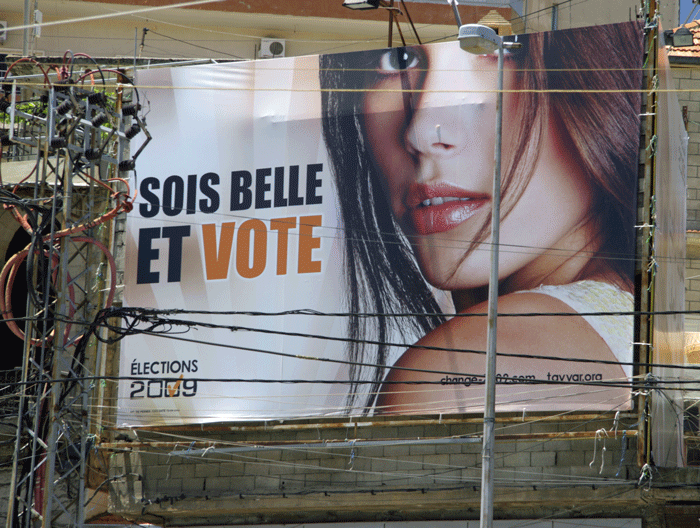
Lebanon's notoriously unreliable state-owned electricity utility has led to a proliferation of local grids. State corruption has been a target of General Michel Aoun's Free Patriotic Movement, which has also distinguished itself with a flashy ad campaign. This ad is aimed at young Christians
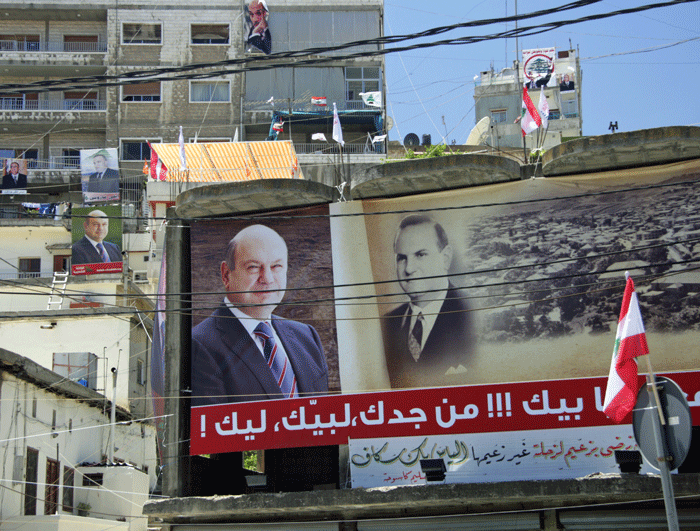
Since Ottoman times, the Skaff family has been among the most dominant in the Bekaa Valley. The Skaffs are now aligned with the March 8 coalition, which includes Hezbollah along with General Aoun's mainly-Christian party. The city of Zahle in the middle of the Bekaa is itself mainly Christian and the competition for votes here is fierce. In the background, you can see the cedar logo of the Lebanese Forces, a Christian party that backs the March 14 coalition.
5th
JUN 2009
Winning the observer lottery
Posted by padams under All, Political Strategy
Paul Adams
Beirut
Election observers may just be the ultimate political wonks. Having arrived in Beirut, many of them jet-lagged from travelling across the globe, the NDI observers for this Sunday’s Lebanese elections were immediately plunged into two days of briefings, running nine or ten hours a day.
The briefings covered Lebanese political history, Lebanese constitutional and electoral law, and the evolution of political culture. There have been briefings on and from the major parties, domestic monitoring groups, and electoral officials. Then there are briefings from NDI: on security, observation procedures, and the political geography of the country.
Observers are emphatically not encouraged to wander around sight-seeing. Partly, in Lebanon, that is a security issue. But equally important to an observation mission is avoiding any suggestion of electoral tourism: some European observers (from another mission) were caught sunbathing on the beach the other day, attracting unfavourable coverage in the local media.
So in lieu of sampling the tourist delights, the moment all serious observers wait for is getting their election day assignments. The organizers don’t release this information until the last moment, to avoid the same kind of jockeying you get when Peewee hockey team lists are named. Just like everyone wants Johnny on the team with his buddy or the one with the great goaltender, observers want to get the constituency with the hottest, most intensely competitive race.
Well, this time I won the lottery. I am off to Zahle in the fabled Bekaa Valley in the morning. Zahle has two Greek Catholic seats, and one Shia, one Sunni, one Maronite, one Greek Orthodox and one Armenian Orthodox. In an election where commentators confidently predict 90% of the races without fear of contradiction, Zahle is the one no one wants to guess at.
In an election some say will come down to a matter of just a few seats between the March 8 coalition — including the big Shia parties and General Aoun’s Christian movement — and March 14 — which includes the big Sunni party as well as most of the other Christian parties — many think the race in Zahle will decide how the country goes.
So, I just won the lottery!
One of my dinner companions this evening, who comes from the region, predicted skirmishes on election day. However, nothing serious, he assured me. NDI has a very risk-averse security policy, so unlike my days as a working journalist, if trouble does occur, I have to head in the other direction.
But Lebanon will have its day on Sunday, at the top of the world’s news, and Zahle may just be at the top of Lebanon’s. So wish me luck.
Paul Adams teaches journalism at Carleton and in is Lebanon this week as an election observer with the National Democratic Institute for International Affairs (NDI).
5th
Adams and Waddell in Policy Options
Posted by padams under All, Media Commentary, Political Strategy
Paul Adams
Chris Waddell and I both have pieces in this month’s Policy Options.
4th
JUN 2009
Lebanon Election Pix
Posted by padams under All, Political Strategy
Paul Adams
Beirut
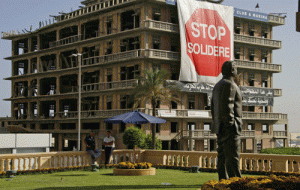
This requires a bit of explanation. The statue is of Rafik Hariri, the former prime minister murdered by a car bomb so enormous that it damaged the buildings around it, including the hotel building you can see in the background. Someone has draped it with a banner protesting the downtown Beirut redevelopment championed by Hariri, but which also drove up the national debt and was allegedly rife with corruption.
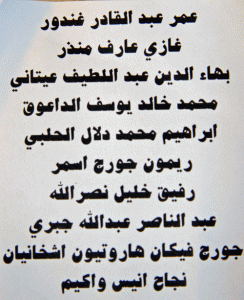
This is a ballot (for the March 8th slate I am told). The parties prepare these filled-in ballots which are handed to supporters, and then deposited in an envelope that goes into the ballot box.
Paul Adams teaches journalism at Carleton and in is Lebanon this week as an election observer with the National Democratic Institute for International Affairs (NDI).
4th
Lost and found
Posted by cwaddell under All, Media Commentary, Political Strategy
Christopher Waddell
Let’s say you work in a store or business and someone comes to see you for a meeting. At the end of the meeting they leave, but forget a binder of documents they brought with them. What do you do?
You could wait and see if they notice they have misplaced something and if they don’t call, just throw the material out. You could look through the material in the folder to determine if there was anything in it that you could use to your advantage and then maybe let them know they had left it behind. (You would have to decide whether to tell them that you looked through it.)
Or you could decide not to look through it but just call the person right away to let them know they had forgotten something and they should come back and retrieve it.
I know that’s what I hope would happen if I was the one who left something behind. It’s clear to me that is the most ethical way to deal with such an issue.
Should the same ethical standard apply when it is a binder of documents about Atomic Energy of Canada left by a minister in this case Natural Resources minister Lisa Raiit or a staff person, in a news organization’s office?
CTV doesn’t think so. It kept the binder for six days presumably waiting to see if anyone would notice it was gone (although it isn’t clear how CTV would determine if that had taken place), read it and reported some of its contents on the air.
It raises good questions that should be debated within news organizations.
On what basis does the media apply a different ethical standard to its activities than the standard we would like applied to us as individuals if we had made the error? Do they need to explain that to the public?
Is there a difference between leaving a document in a public place like a coffee shop or on a bus or blowing down the street, than leaving something at an office where you attended a meeting? I think there is.
What if the story had been handled somewhat differently – calling right away and telling the minster something had been left behind and not looking at the contents. Then deciding whether to report that the minister was careless with documents – which is a legitimate story – by explaining to viewers the circumstances and telling your audience that on ethical grounds you had made the decision not to read the contents of the binder.
Unrealistic? Too much to ask?
Christopher Waddell is associate director of the School of Journalism and Communication and Carty Chair in Business and Financial Journalism at Carleton University. He is a former reporter, Ottawa bureau chief, national editor and associate editor of the Globe and Mail and a former CBC-TV parliamentary bureau chief and executive producer-news specials for CBC TV News.
4th
The Lebanese way
Posted by padams under All, Political Strategy
Paul Adams
Beirut
The minute you emerge from the baggage area at Beirut airport, you know there’s an election on. My flight from Paris was packed with ex-pat Lebanese, some who made their travel plans specifically with this Sunday’s election in mind — and there were throngs of family members there to greet the arriving passengers.
Driving out of the airport, the billboards that usually advertise luxury consumer goods instead have stylish graphics promoting the dozens of parties, most of them appealing to a specific “confessional”, or religious community. These parties are in turn grouped into two large coalitions, confusingly dubbed March 8 and March 14. March 8 includes the major Shiite parties (Hezbollah and Amal), the Armenian party, and Michel Aoun’s Christian party. March 14 includes the largest Sunni party, which is led by the son of the slain former prime minister Rafik Hariri, along with several Christian parties and the main Druze party.
The election will be held using a set of rules completely unique to Lebanon.
Lebanese don’t necessarily vote where they live, but rather need to return to their “ancestral villages”. Of course there were huge migrations in populations during this country’s civil and international wars, so there will be huge traffic problems on Sunday when, in a departure from tradition, all the voting will take place on one day.
Voting occurs in multi-member constituencies that are divided up according to religion. So Beirut Three, for example, has five Sunni seats, and one each for the Shia, Druze, Greek Orthodox, Evangelical and Christian Minorities. Candidates have to be of the designated religion, but all voters get to vote for each seat regardless of their denomination.
As a practical matter, what this means is that the various parties work out deals amongst themselves, and then encourage their supporters to support their negotiated slate.
How is a poor voter supposed to keep track of all this? Well, that’s where the most peculiar feature of the Lebanese system comes into play. There is no pre-printed ballot. That’s right: no ballot.
The parties print up slips of paper with the agreed-upon candidates listed, which they hand out to their supporters at the polls. Voters simply stick these slips of paper in the box to vote.
Of course, if you are of an independent mind, you can cross out a candidate and write in the name of another. Or if you are really a maverick, polling officials will give you a blank piece of paper on which you can write out your choices.
Paul Adams teaches journalism at Carleton and in is Lebanon this week as an election observer with the National Democratic Institute for International Affairs (NDI)
Recent Posts:
- 04 May 2011 Twitter and elections: ta...
- 04 May 2011 The Conservative fork in ...
- 03 May 2011 Ignatieff’s pre-mat...
- 03 May 2011 Final Observations
- 30 Apr 2011 Counting up the newspaper...
- 29 Apr 2011 Seat projections…do...
- 27 Apr 2011 Royals versus politicians...
- 27 Apr 2011 Outing a Tory dirty trick...
- 26 Apr 2011 Those advance polls
- 26 Apr 2011 The trouble with Liberals...
Categories:
- All (93)
- Election 2008 (117)
- Election 2008 Campaign strategy (46)
- Election 2008 Faculty links (12)
- Election 2008 Media commentary (51)
- Election 2008 Student articles (37)
- Election 2011 (53)
- Election 2011 Campaign strategy (45)
- Election 2011 Faculty links (38)
- Election 2011 Media commentary (36)
- Election 2011 Student articles (1)
- Media Commentary (48)
- Political Strategy (50)
- Post-election (3)
- Uncategorized (1)
Archives:
- May 2011
- April 2011
- March 2011
- March 2010
- February 2010
- January 2010
- December 2009
- November 2009
- October 2009
- September 2009
- July 2009
- June 2009
- May 2009
- April 2009
- October 2008
- September 2008


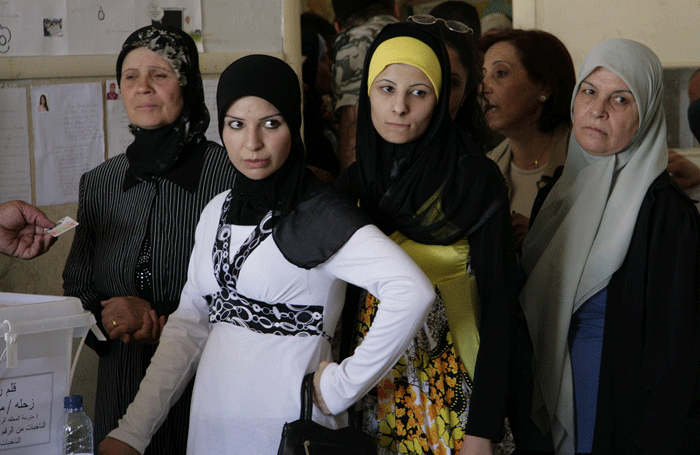
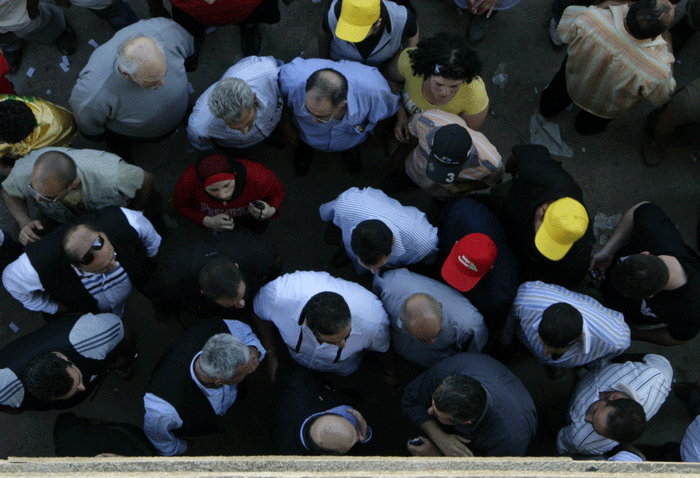
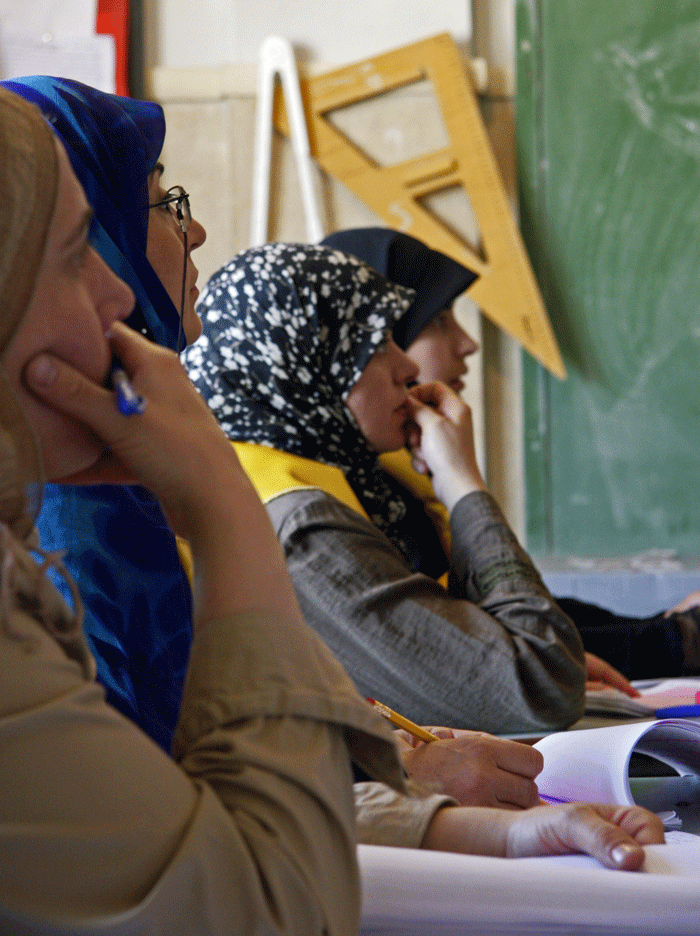
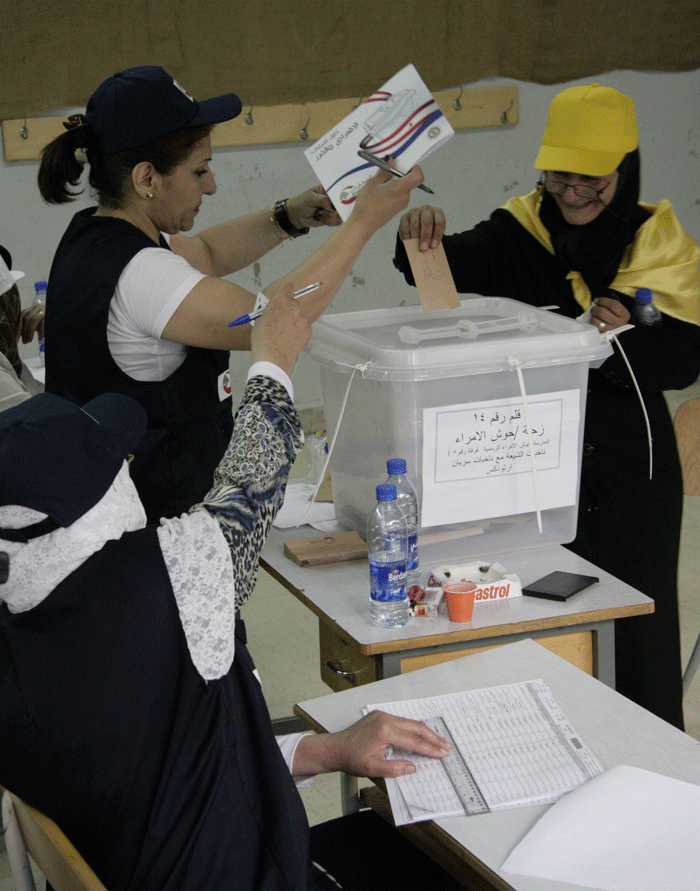
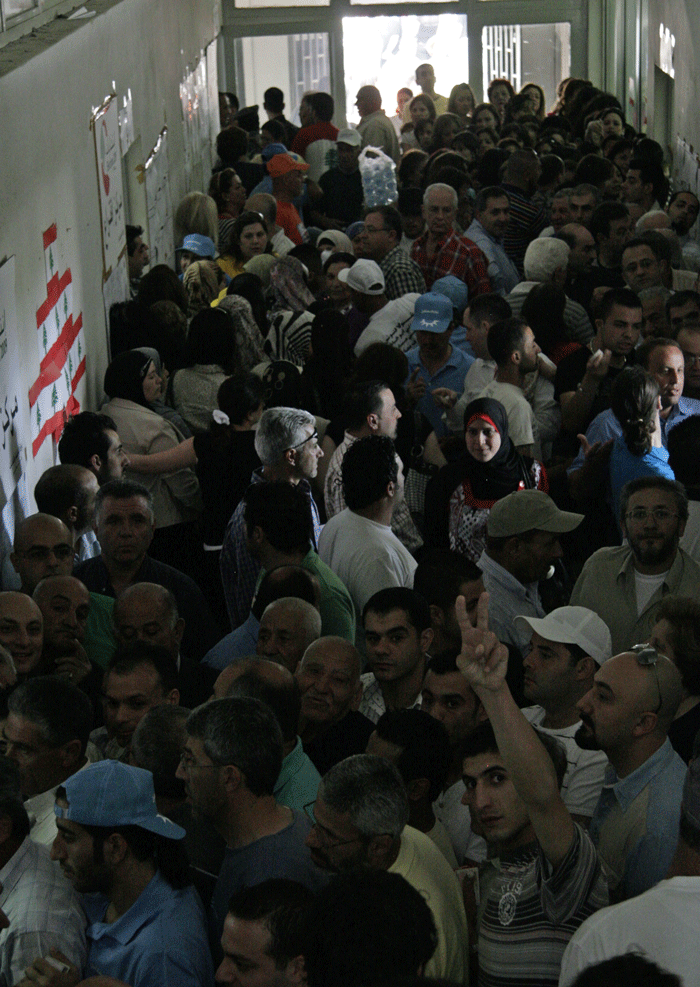
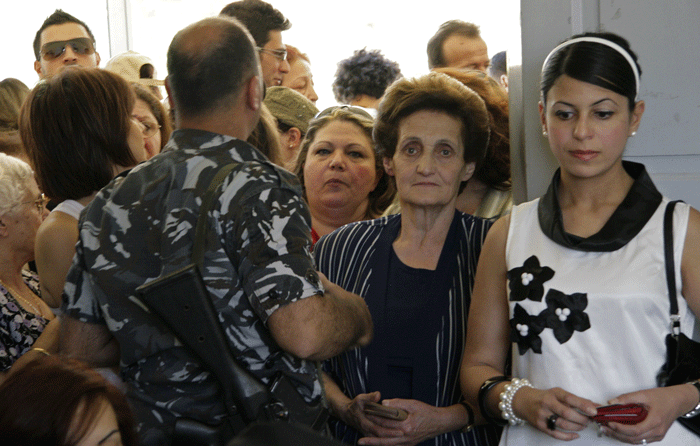

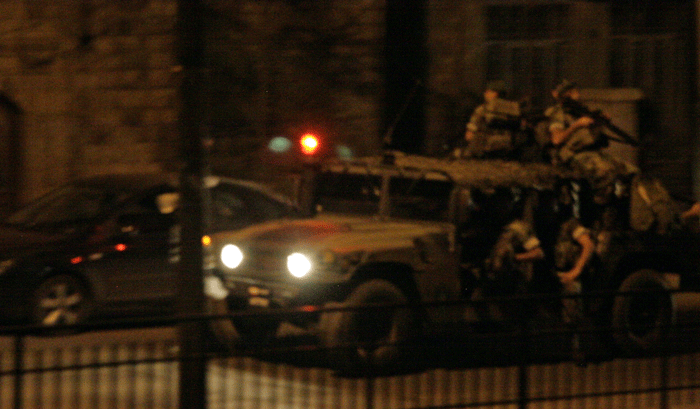
 RSS Feed
RSS Feed